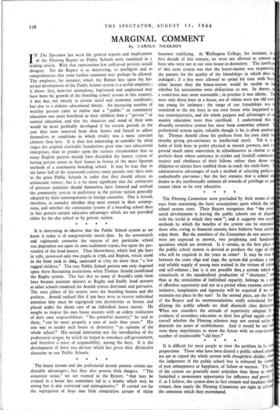The house system and the prefectorial system possess certain un-
deniable advantages ; but they also possess their dangers. "The corporate sense," we are warned in the Report, "that may be created in a house has sometimes led to a loyalty which may be strong but is also restricted and unimaginative." If carried too far the segregation of boys into little competitive groups of thirty becomes stultifying. At Wellington College, for instance, in first decade of this century, we were not allowed to consort boys who were not in our own house or dormitory. The justifies of this caste system was that the house-master was responsible the parents for the quality of the friendships in which their indulged ; if a boy were allowed to spend his time with boys other houses then the house-master would be unable to j whether his associations were deleterious or not. In theory, a restriction may seem reasonable ; in practice it was idiotic. were only thirty boys in a house, ten of whom were too old and too young for intimacy ; the range of our friendships was restricted to the ten boys in our own house who happened te our contemporaries, and the whole purpose and advantages of c munity education were thus sacrificed. I understand that absurdly restrictive system has since been somewhat relaxed prefectorial system again, valuable though it be, is often pushed far. Thomas Arnold chose his prefects from his own sixth thereby giving pre-eminence to intellectual merit. Yet it is habit of little boys to prefer physical to mental prowess, and it proved much more convenient to schoolmasters to choose as prefects those whose eminence in cricket and football command respect and obedience of their fellows rather than those u diligence or talents have enabled them to reach the sixth form. administrative advantages of such a method of selecting prefects undoubtedly enormous ; but the fact remains that a school w denies to the intellectually eminent all rewards of privilege or cannot claim to be very educative.


























 Previous page
Previous page